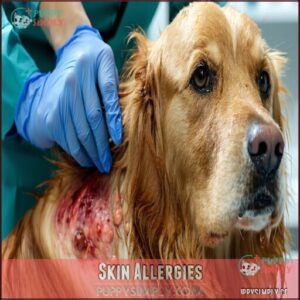This site is supported by our readers. We may earn a commission, at no cost to you, if you purchase through links.
 An allergy test for dogs helps you figure out what’s causing your pup’s itching, sneezing, or constant paw-licking.
An allergy test for dogs helps you figure out what’s causing your pup’s itching, sneezing, or constant paw-licking.
There are two main types: blood tests, which check for environmental or food allergens, and intradermal tests, where small allergens are injected into the skin (typically done by a vet).
At-home tests, like saliva or hair kits, are growing in popularity but may not be as accurate.
Identifying allergens lets you work with your vet on treatments like special diets, medications, or avoidance strategies.
Think of it as giving your best friend a way to enjoy life without all the scratching!
Table Of Contents
- Key Takeaways
- What is Atopic Dermatitis
- Can Dogs Have Allergies
- What is a Dog Allergy Test
- How Does It Work
- Which Allergy Test is Best
- Where is It Used
- How Are The Results Used
- What Are The Most Common Allergies in Dogs
- Frequently Asked Questions (FAQs)
- Does My Dog Need A New Food Diet?
- What Is The Difference Between A Blood & Skin Dog Allergy Test?
- When To Visit A Dog Allergist?
- Are dog allergy tests worth it?
- How much does an allergy test cost for dogs?
- How do they test for dog allergies?
- How can I find out if I am allergic to my dog?
- What is a dog allergy test?
- How does one test a baby for milk allergy?
- How can I get a dog allergy test?
- Conclusion
Key Takeaways
- You can choose between veterinary tests (accurate but costly) or at-home kits (convenient but less reliable) to identify your dog’s allergens.
- Skin tests and blood tests are the most common methods, with skin tests being the gold standard for accuracy.
- Allergy tests help pinpoint triggers like pollen, food, or fleas, enabling customized treatments like immunotherapy or dietary changes.
- Work with your vet to interpret test results and develop a tailored plan for your dog’s long-term comfort and relief.
What is Atopic Dermatitis
Atopic dermatitis is a common skin condition in dogs caused by their immune system overreacting to environmental allergens like pollen or dust.
It leads to intense itching, redness, and discomfort, often requiring lifelong management to keep your dog comfortable, which involves understanding and managing environmental allergens.
Causes and Symptoms of Atopy
Atopy, or atopic dermatitis, stems from a genetic predisposition causing an overactive immune response to environmental allergies in dogs.
Atopy sparks itchy chaos in dogs, as their immune system overreacts to everyday allergens like pollen and dust.
Breeds like Golden Retrievers and Bulldogs have heightened breed susceptibility.
Symptoms often include itching, redness, and inflammation, with the damaged skin barrier inviting secondary infections.
You might notice excessive licking or scratching—clear signs of dog skin allergy frustration, which can lead to secondary infections.
Diagnosis and Treatment Options
Diagnosing dog allergies starts with ruling out other conditions.
Allergy testing helps pinpoint triggers, guiding treatment.
Treatment options include:
- Immunotherapy options: Allergy shots or drops can build tolerance over time.
Consider allergy relief drops as another option.
- Symptom management: Medications and bathing ease itching and irritation.
- Dietary changes: Elimination diets address food sensitivities.
Consult your vet for personalized dog allergy relief and effective treatment plans.
Atopy in Dogs and Humans
Both dogs and humans can share a frustrating connection through atopy. It’s a fancy word for genetic predisposition to overreact to allergens like pollen or dust.
While the immune response is protective, in atopic dermatitis, it overdoes things, causing itchy misery.
Treatment parallels include allergy tests and managing environmental factors. Identifying triggers helps improve life quality for everyone—fur or no fur, which can lead to a better understanding of how to manage allergens.
Common Allergens in Atopic Dermatitis
Common allergens in atopic dermatitis often include environmental triggers like pollen sensitivities from grasses, trees, and weeds.
Dust mite allergy and mold reactions are also frequent culprits.
These sneaky irritants can make your dog scratch like it’s auditioning for a flea commercial.
Grass allergens and weed triggers are particularly tricky since they’re everywhere dogs love to roll, sniff, and explore, making them a significant environmental trigger.
How Atopic Dermatitis Affects Quality of Life
When your pup constantly itches due to atopic dermatitis, it’s more than just a nuisance.
Itching doesn’t just bother your dog—it disrupts their life and yours, calling for effective allergy relief.
Sleep disturbances, social isolation, and even behavioral changes can creep in, leaving everyone stressed.
Chronic skin inflammation doesn’t just affect your dog—it impacts your quality of life too.
Living with an allergic skin disease means managing shared frustrations while improving your pet’s comfort becomes your top priority.
Can Dogs Have Allergies
Yes, dogs can have allergies, just like people.
Their immune systems react to substances like pollen, certain foods, or flea bites, leading to uncomfortable symptoms.
These symptoms can affect their skin, digestion, and overall well-being.
Prevalence and Types of Dog Allergies
Did you know about 20% of dogs develop allergies during their lives.
Allergy statistics show environmental allergies in dogs are on the rise, with regional allergens like pollen and molds causing itchy chaos.
Some breeds have a stronger predisposition, while emerging allergens surprise unsuspecting pet owners.
Allergy testing helps identify triggers, guiding treatments that improve your furry friend’s comfort and health.
Common Environmental and Food Allergens
Your dog’s sniffles might be hiding behind environmental allergens or food allergens.
Environmental triggers include pollen allergies, dust mites, and mold exposure, often linked to seasonal allergies.
Food sensitivities stem from common ingredients in dog foods like chicken or wheat.
Here’s a quick snapshot:
- Environmental allergens: Pollen, dust mites, molds.
- Food allergens: Chicken, dairy, soy.
- Household items: Cleaners, fabrics.
Symptoms and Signs of Dog Allergies
Itchiness and allergies can lead to constant dog itching, causing skin reactions like redness, rashes, or painful skin lesions.
Sometimes, allergy symptoms affect digestion, triggering vomiting or diarrhea, while respiratory signs, like sneezing or nasal discharge, appear less often.
Over time, untreated dog allergy symptoms may result in secondary infections. Always consult a vet to address your dog’s itching and discomfort effectively.
What is a Dog Allergy Test
A dog allergy test helps you pinpoint the specific substances causing your pet’s allergic reactions.
By identifying these triggers, you can work with your vet to create a plan that minimizes your dog’s discomfort.
Types of Dog Allergy Tests
Dog allergy tests come in several forms.
The two most trusted are:
- Intradermal Testing: Injects allergens under the skin to check reactions.
- Serum Testing: A dog blood allergy test measuring IgE antibodies.
- Diet Trials: The gold standard for food sensitivities.
- Saliva Tests & Hair Analysis: At-home dog allergy test options, although less reliable and often debated.
At-Home Dog Allergy Tests
At-home dog allergy test kits are a simple way to identify potential allergens without a vet visit.
Using hair and saliva tests, these at-home tests are non-invasive and budget-friendly, though test validity can vary by brand.
Sample collection is quick and easy. Environmental allergy kits offer detailed results.
While not a substitute for professional care, they can guide DIY treatment and cost comparison effectively, making them a useful tool for at-home tests, and helping to identify potential allergens.
How Does It Work
Allergy tests for dogs work by identifying how your dog’s immune system reacts to specific allergens, like pollen or dust mites.
Whether it’s a blood sample or a skin test, the process measures antibodies or skin responses to pinpoint what’s triggering the allergies.
At-Home Dog Allergy Test Process
An at-home dog allergy test is simple.
Kits typically include collection swabs or vials for gathering fur or saliva samples.
Owner compliance is essential—be precise during sample collection.
Once mailed, result turnaround takes weeks.
At-home allergy test kits promise convenience but have testing limitations, so don’t skip veterinary input.
These dog allergy tests offer accessible insights for curious pet owners.
Accuracy and Reliability of Dog Allergy Tests
Accuracy in allergy testing depends on test sensitivity and specificity.
Intradermal testing, the gold standard, offers better reliability but requires sedation.
Blood tests are convenient but prone to false positive test results, affecting interpretation.
At-home tests lack validation and show poor reproducibility.
For trustworthy results, rely on veterinary-directed methods, as the reliability of tests guarantees effective treatment planning and fewer surprises, ensuring effective treatment.
Which Allergy Test is Best
Choosing the best allergy test for your dog depends on their symptoms and your goals for treatment.
Veterinary tests offer greater accuracy, while at-home options are more convenient but less reliable.
At-Home Dog Allergy Tests Vs Veterinary Tests
Choosing between an at-home dog allergy test and a visit to a veterinary dermatologist boils down to accuracy comparison, cost differences, and convenience factors.
At-home tests are cheaper and simpler but may lack precision.
Veterinary allergy testing boasts higher accuracy and better treatment options.
Still, interpreting results or creating a treatment plan often needs expert guidance. Environmental allergy kits use hair samples for results.
Both approaches serve unique needs, considering factors such as convenience factors.
Factors to Consider When Choosing a Dog Allergy Test
When picking an allergy test for dogs, think about test accuracy, your budget, and your pup’s history.
While at-home dog allergy tests are convenient, their reliability varies.
Veterinary tests offer better accuracy, especially for creating treatment options.
Always follow veterinarian advice—they’ll guide you through options, balancing cost comparison with your dog’s needs for the best outcome in allergy testing dogs.
Where is It Used
You’ll most commonly find dog allergy tests used in veterinary clinics and hospitals, where professionals can administer and interpret them accurately.
Some at-home tests are also sold through pet stores or online, but their reliability is often debated, which can impact the accuracy of the results.
Veterinary Clinics and Hospitals
Veterinary clinics and hospitals are essential for accurate allergy testing in dogs.
Clinics provide access to specialists like veterinary dermatologists and offer intradermal allergy testing (IDAT). Here’s what to expect:
- Clinic Accessibility: Easy appointments for allergy tests.
- Specialist Referrals: In-depth insights from experts.
- Emergency Services: Quick care for allergen reactions.
- Testing Availability: Extensive options.
- Cost Transparency: Clear pricing upfront.
Vaccinations are important for disease prevention in pets, ensuring their overall health and well-being.
Pet Stores and Online Retailers
You’ll find dog allergy test kits at pet stores and online retailers, offering convenience for busy pet parents.
Online test availability means at-home testing is easier than ever, but remember: not all dog allergy test brands are created equal.
Check dog allergy test reviews to compare cost, Retailer Test Accuracy, and Brand Reliability before choosing the right option.
How Are The Results Used
You’ll use the results of a dog allergy test to identify specific allergens affecting your pet.
This information helps your veterinarian create a customized treatment plan, whether that’s allergen avoidance, medications, or immunotherapy.
Interpreting Dog Allergy Test Results
After allergy testing, results reveal allergens tied to IgE levels.
Scores indicate allergen relevance but may show false positives.
Connect results with clinical signs like itching or redness for an accurate diagnosis.
Veterinary recommendations guarantee reliable interpretation, avoiding guesswork.
Remember, the goal of an allergy test for dogs is understanding triggers to guide proper care and treatment options effectively.
Creating a Treatment Plan for Dogs
Turning allergy testing results into a customized treatment plan is like solving a puzzle for your pup’s comfort.
Combine allergen avoidance, immunotherapy options, and symptom management to ease discomfort.
- Explore dietary changes to tackle food-related issues.
- Consider immunotherapy for long-term care and relief.
- Implement practical adjustments for better dog allergy management.
Many owners seek effective allergy solutions to ease their pet’s suffering.
Every treatment plan is unique—a true relief for your furry friend, providing effective allergy solutions and a better dog allergy management plan.
Monitoring Progress and Adjusting Treatment
Tracking symptoms helps you spot how well your dog’s allergy treatment works.
Pay attention to clinical signs like reduced itching or skin issues, and work with your vet for dosage adjustments.
Long-term management often includes monitoring treatment efficacy and making environmental control changes.
Staying consistent guarantees personalized allergy treatments target your pup’s needs, paving the way for noticeable symptom reduction over time.
What Are The Most Common Allergies in Dogs
If your dog seems to itch year-round or has unexplained digestive troubles, they might’ve allergies to common triggers like pollen, food ingredients, or flea bites.
Knowing the most common culprits can help you and your vet pinpoint the source and create an effective treatment plan.
Environmental Allergens
You’re likely familiar with environmental allergies in dogs, especially if your furry friend struggles with atopic dermatitis.
Common allergens like pollen, mold, and dust mites often lead to itching and irritation. These triggers vary seasonally and are hard to avoid.
- Pollen Allergies – Trees, weeds, and grasses.
- Mold Sensitivity – Indoors or outdoors.
- Dust Mites – Lurking in bedding or carpets.
Food Allergens
Food allergies in dogs might seem tricky, but elimination diet trials and novel proteins can help pinpoint culprits like chicken or soy.
While food allergen testing panels exist, an elimination diet trial remains the gold standard.
Hydrolyzed diets, which break proteins into tiny bits, are another option.
Talk to your vet about food allergy test dog strategies for lasting relief!
Flea Allergies
Flea allergies can turn a tiny bite into a huge ordeal for your dog.
Flea Bite Dermatitis causes intense itching, red skin, and hair loss.
Flea Allergy Testing helps confirm the issue.
Flea Allergy Treatment focuses on soothing the skin and eliminating fleas.
Consistent flea control using flea medications and flea prevention measures keeps these pesky parasites at bay.
Regular cleaning can help with flea lifecycle management, which is crucial for effective management.
Skin Allergies
Skin allergies in dogs often show as constant scratching, redness, or sores. Some breeds are more prone due to a weaker skin barrier, making them targets for secondary infections.
Atopic dermatitis, often linked to environmental triggers, is common. For relief, consider specialized allergy products.
An allergy test for dogs, like intradermal allergy testing (IDAT), pinpoints allergens for customized itch relief and effective allergy prevention.
Frequently Asked Questions (FAQs)
Does My Dog Need A New Food Diet?
Imagine this: your dog’s constant scratching feels like watching a mystery unfold.
A diet change could help if symptoms persist after ruling out other allergies.
Talk to your vet to explore food trials or solutions.
What Is The Difference Between A Blood & Skin Dog Allergy Test?
Blood tests measure circulating IgE antibodies from a single sample, offering convenience without sedation.
Skin tests, considered the gold standard, inject allergens to assess reactions directly.
They’re more accurate but require sedation and specialized expertise.
When To Visit A Dog Allergist?
Visit a dog allergist when your pup shows persistent itching, redness, or ear infections despite treatment.
If seasonal or environmental factors worsen symptoms, or allergy meds aren’t cutting it, an allergist can pinpoint triggers efficiently, and this can help when symptoms persist.
Are dog allergy tests worth it?
Dog allergy tests can be worth it if your pup suffers from persistent itching, redness, or other allergy signs.
They help pinpoint triggers for customized treatments like immunotherapy, improving your dog’s comfort and quality of life.
How much does an allergy test cost for dogs?
Around 20% of dogs experience allergies, and testing costs vary. Intradermal skin tests range from $195 to $350, while serum blood testing costs $80 to $ Remember, some regions charge more for these tests!
How do they test for dog allergies?
To check for allergies, vets use skin or blood tests to identify triggers like pollen, dust, or food.
Skin tests involve injecting allergens, while blood tests analyze IgE levels.
It’s quick and keeps tails wagging!
How can I find out if I am allergic to my dog?
Figuring out if you’re allergic to your dog starts with an allergist who can do a skin or blood test.
Symptoms like sneezing or itchy eyes when cuddling Fido might signal pet dander issues.
What is a dog allergy test?
Imagine pinpointing your dog’s sneezes or itchy skin.
A dog allergy test, like a detective’s kit, identifies allergens such as pollen or dust.
It’s a blood test or intradermal exam guiding effective treatment pathways.
How does one test a baby for milk allergy?
To test a baby for a milk allergy, doctors typically do skin prick tests or blood tests to check IgE antibodies.
Sometimes, an elimination diet is used, supervised closely to prevent nutritional issues, which can be a critical step in diagnosing a milk allergy.
How can I get a dog allergy test?
Finding out what’s bugging your dog isn’t rocket science.
Start with your vet—serum or intradermal tests pinpoint environmental triggers.
For food allergies, skip the gadgets; stick with a trusted elimination diet plan.
Conclusion
In the case of allergies, stopping them in their tracks can make life better for you and your dog.
An allergy test for dogs helps identify what’s causing their itching or discomfort, whether it’s food, fleas, or environmental triggers.
Knowing the allergens lets you work with your vet to create a targeted treatment plan, like a special diet or medications.
A little effort upfront can mean a future with fewer scratches, sneezes, and happier tails!
- https://emergencyvetsusa.com/
- https://www.avma.org/javma-news/2018-07-15/banfield-few-pets-allergic-food-flea-environmental-allergies-rise
- https://bluepearlvet.com/hospital/naples-fl/our-vets/
- https://www.easy-dna.com/dog-allergy-test/?afl=YKHRKPY-27
- https://www.veterinaryirelandjournal.com/small-animal/279-allergy-and-immunoglobulin-e-an-evolving-understanding-of-the-relationship


















